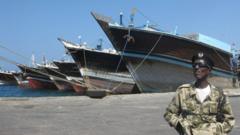In a bold stance against the Somali central government, Somaliland officials emphasize their right to operate key strategic ports such as Berbera.
Somaliland Challenges Somalia's Port Control Proposal in Berbera

Somaliland Challenges Somalia's Port Control Proposal in Berbera
Somaliland firmly rejects Somalia's offer to hand over port facilities to the U.S., citing sovereignty concerns.
Somaliland, the self-declared independent region of Somalia, has outright rejected the federal government's proposal to grant the United States exclusive control over pivotal port and airbase facilities located in Berbera. This northern coastal city holds significant strategic value on the Gulf of Aden. The offer, made by Somalia's President Hassan Sheikh Mohamud in a letter to U.S. President Donald Trump, claims that the four facilities would enhance U.S. security operations in the region.
Responding to the offer, Somaliland's Foreign Affairs Minister Abdirahman Dahir Aden dismissed the move as an act of desperation, stating that the properties in question do not belong to Mogadishu to allocate. Expressing confidence in Somaliland’s future, Minister Aden took to social media, asserting that the U.S. would soon acknowledge the territory's autonomy.
The port of Berbera is currently operated by DP World from the United Arab Emirates, a key ally of the U.S. Aden indicated that American leaders are astute enough to recognize the importance of directly engaging with Somaliland. "The USA is not foolish," he remarked, implying that they understand who has legitimate control over Berbera.
Recently, the U.S. has played a crucial role in supporting Somalia's fight against the al-Shabab militant group, which has significant influence across southern and central Somalia. Speculation is rife that Mogadishu fears diminishing U.S. support, especially as President Trump approaches his second term. The Somali government has taken additional steps to bolster relations, including signing agreements with lobbyists to enhance U.S.-Somali relations.
Somaliland's strategic position has resulted in previous disputes over control. The current situation is reminiscent of earlier tensions when Ethiopia sought to develop ports in Somaliland, which Somalia viewed as infringing its territorial rights. Additional complexities arose with the semi-autonomous region of Puntland, as the federal offer could strain ties if not properly coordinated with local authorities.
President Mohamud's letter carefully articulates that exclusive control over the mentioned airbases and ports could strengthen U.S. presence in the strategically essential Horn of Africa region, likely in response to influences from rivals such as Russia and China. Despite this, any unilateral decision regarding Puntland's port of Bosaso may escalate tensions between regional authorities and the federal government.
In the background of these discussions persists a history of territorial disputes, with both domestic and international players vying for influence within this crucial corridor, hinting that the road to peace and cooperation remains fraught with challenges.



















